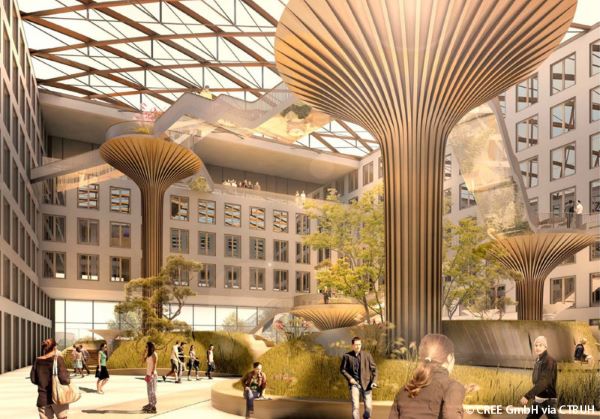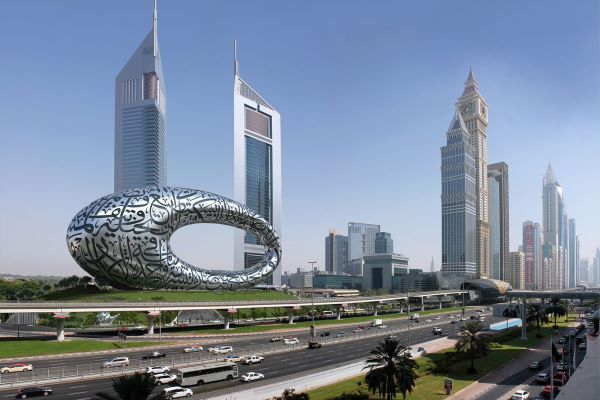In May last year, James Bruce was appointed as Buro Happold's new chief executive officer. One year into his new role, we asked James about his views on some of the key issues facing the construction and infrastructure industry and his thoughts on the challenges his and other firms face.
Tell us a bit about your role and your career journey to date?
I joined Buro Happold in 2018 as chief operating officer and was voted in by the partners as CEO nearly a year ago in May 2021. Despite the obvious difficulties that a global pandemic can bring, it has been a thrilling journey thus far and I have loved nothing more than meeting as many of our inspirational clients, engineers, consultants and support staff as possible that we have around the world. I feel passionately about the work we do and am proud of how it reflects our beliefs and values that have been embedded within the partnership since its inception 46 years ago. We’ve always been a diverse firm and always focused on doing everything with as light a touch on the earth as possible, while leaving a lasting, meaningful legacy.
Perhaps unusual for the built environment, my background is in executive and financial roles primarily in the advertising and branding world. Graduating from Durham University, I have worked all over the world spending significant time in New York and Melbourne as well as at home in the UK. I’ve had exciting roles as COO/CFO within WPP and Omnicom working for their subsidiaries Interbrand, DDB, Fitch and Landor - always with a real focus on growth and driving efficiency. In fact, the reason I was brought into Buro Happold initially was to deliver more focused growth to help build a more resilient and diversified business. Together, we’ve set new ambitious and exciting plans for the future.
What are the key issues facing the industry as you see them currently?
In the short term, we are seeing a real war on talent. We therefore want to continue to ensure Buro Happold is as an attractive a place as possible for all our current and future talent.
Geopolitical tensions and their devastating impact are upsetting for all of us. The industry as a result is now facing significant inflationary and supply chain issues, issues that were already having an impact after years of Covid. We are working closely with our clients and partners to address these.
Buro Happold prides itself in taking the lead on what we see as the imperative need for collective climate action. As engineers and consultants, we are in a somewhat unique position where we can help clients achieve the seismic shift that is needed to achieve their own aggressive sustainability targets, while also making a real difference and change within our own carbon intensive industry.
Diversity and inclusion is an increasingly important issue for the sector – are we doing enough as a sector and how can we move faster?
To be blunt, no. Everyone needs to bring public commitments into reality. Every company in our sector needs to set meaningful targets, create inclusive and respectful cultures where everyone is valued and recognise it will take a sustained effort from everyone.
To move faster as an industry, we cannot expect this to be tackled solely by bottom-up activity. Personally, I take this commitment very seriously, as do my leadership team and I’m encouraged when other CEOs do the same. I would like to see all organisations considering it in everything they do from where you encourage work experience pupils from to it being top of the boardroom agenda.
I attend all our regional equity reviews and each has ambitious plans that we measure and hold ourselves accountable to. Each region works slightly differently, but we are all working towards a common goal where equity, diversity and inclusion is at the top of our agenda, from how we operate to the projects that we work on and how we support the communities we serve
We regularly challenge ourselves and ask our clients whether we are meeting their expectations on diversity and whether we have brought social value to their projects. We must constantly challenge ourselves to not remain complacent.

Why do you think Buro Happold is a brilliant place to work for and what makes it different?
Our people and their genuine desire to make a difference. But at Buro Happold it isn’t just a desire, our people really are making a difference every day on their projects. From designing one of the largest modular timber hybrid constructions in Germany, EDGE Suedkreuz (pictured above), to advising the County of Los Angeles on their populations most at risk of climate vulnerability.
Our heritage and legacy within the built environment are world renowned and outstanding. I feel extremely privileged to play a small part in our history so far. Our founding principles of creativity, the pursuit of tackling the complex and mutual respect carries through to today and I hope for many decades to come.
Part of our strategy is sustained growth in the US market and development of our consulting offer, providing exciting development opportunities for our people to work on a range of interesting global projects. Despite the challenges of recent times, our compassion, resilience and ability to have fun have held strong. Everyone has cared and showed great empathy for one another during the past two years. It makes me incredibly proud and I feel privileged to be CEO of this great practice.
How do you think that Covid will affect the working patterns of the industry and what are the opportunities arising from changes that will arise?
It’s an exciting time to be leading a business during this seismic but challenging shift. We must embrace agile working patterns that work for the good of everyone but also allows us to work with our clients most effectively.
We are creative people that thrive on interaction, but we must create inclusive working environments and use agile technology to facilitate this as we build back. One of the best things to have come out of working remotely has been the realisation from the industry that we can work on projects seamlessly and still serve our clients around the world. While we were doing this prior to the pandemic, it has now become an embedded part of the way we work.
I’m a people person and thrive on being in the office and having the ability to travel - but a mixture of that and home working has created the opportunity to spend more time with my family and reduce my carbon footprint.
The biggest opportunity is more diversity and more inclusive working practices that flexible working patterns can create. We can hopefully bring in, for example, more neurodiversity, more people with caring responsibilities and those from a broader geographical reach.
One of the big issues that Infrastructure Intelligence is seeing currently is social value. How important is this to Buro Happold?
Just as industries now recognise that emissions reduction alone is not enough to adapt to and mitigate climate change, as a sector we must realise the value that a project creates doesn’t end at its architectural or engineering merits.
In order for humans to flourish, governments, developers and asset managers need to consider the impact of their buildings on the safety, security and prosperity of the local community. Social value has wider socioeconomic impacts on local supply chains, affordability, community cohesion and future generations.
Social value is at the core of all our projects as it improves the health, wellbeing and resilience of our communities. Moreover, these principles help to reduce inequalities in health, education and social justice.
At Buro Happold we are expanding our Environmental Social Governance (ESG) and social value consultancy expertise offer to clients. Our experts come from a wide range of disciplines including architects, economists, engineers and social scientists. We adopt integrated thinking from professional practice, legislation, academic research and both national and international standards to inform our social value work.

How can we make the industry more attractive to recruit more people into a sector that literally changes the world?
Who wouldn’t want to change the world for the better? The twin crises of climate and biodiversity breakdown is the biggest challenge and opportunity of our lifetimes. But big problems require a radical shift and we need the broadest range of talent to tackle it.
We must encourage more people to embrace the opportunity to make a difference. We also need to have a big push on equity and attract people from the broadest of backgrounds.
At Buro Happold we have artists to consultants to architects to traditional engineers. We need to embrace non-traditional routes and encourage more apprenticeships. We need to attract people from every walk of life and communicate clearly what is possible to achieve in this industry, particularly how we can directly improve the environments in which people live. This is a top focus for the Royal Academy of Engineering right now and something we are very proud to stand behind.
We need to pay well and equitably, we need to celebrate the amazing industry that we represent and we need to embrace change.
How important is the digital agenda to Buro Happold and how is it changing the way you work?
From computational engineering and digital twins to 360 visualisations, there is not an area of the digital future that our people do not get excited about. In our now data rich society, we must harness our access to deliver societal and material benefits. Digital now flows through every element of what we do. Technology is an enabler and it’s important we leverage this to both deliver projects more advanced than ever before but to also drive efficiencies and limit our carbon footprint.
Buro Happold has embraced a data-driven design approach for many years – this is known as evidence-based design. This creative engineering mindset enables our people to work more effectively by using data insights to help achieve the client’s vision. Through analytics, we can empower clients to optimise design and operation of their facilities – for example, improving workplace wellbeing to heighten employee productivity.
Intelligent use of shared data will allow the industry to do much more with less square footage, driving down carbon in both embodied and emission form.
A truly awesome, and perhaps somewhat under the radar, digital innovation within our practice was the creation of an open source buildings and habitats object model (the BHoM). Developed by Buro Happold directors Al Fisher and Rob May and the ‘computational collective’, the BHoM is an industry-wide computational project that aims to support greater collaboration by enabling architects, engineers and contractors to standardise design data and share code. Its core purpose is to tackle the problem of interoperability between software, so that we can transfer design models between platforms efficiently without losing information.
The computational collective sums up Buro Happold nicely for me - a diverse and global collective made up of all disciplines, convening for the sole purpose to make a change that has sparked a new conversation about the way we can work better across the architectural, engineering and construction industry.

